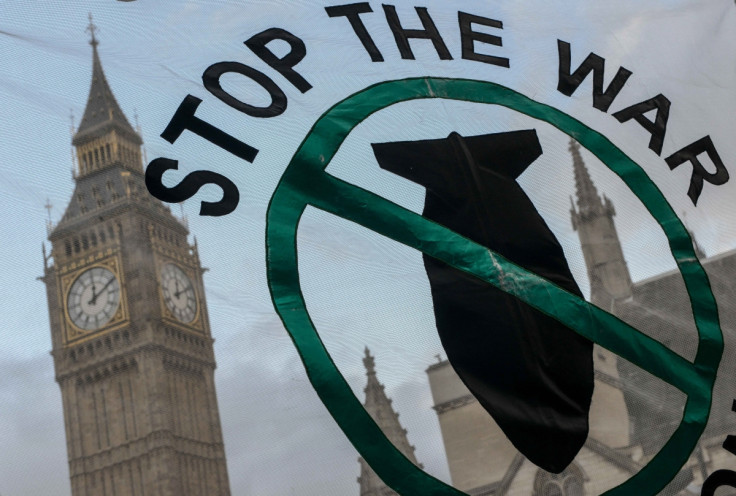British Muslims turn their backs on Stop the War Coalition over Bashar al-Assad 'apologists'

A senior figure at the Stop the War Coalition has said that the under-fire anti-war pressure group linked to Labour leader Jeremy Corbyn is alienating British Muslims because of its "confused" views on the Middle East and perceived support for Syrian dictator Bashar al-Assad.
He said that British Muslims were abandoning the Stop the War Coalition, which was formed in 2001 in response to the war in Afghanistan and went on to protest British intervention in Iraq and Libya, in droves since the beginning of Syria's civil war.
While condemning what he branded a "witch-hunt" against the anti-war group in recent weeks, the senior Muslim insider also said that Corbyn, a former chairman of the group, should consider cutting his ties with the coalition to protect his future as Labour leader.
His comments come just days after Green Party MP Caroline Lucas resigned as patron after the Stop the War Coalition said that France had "reaped the whirlwind" of supporting Western military intervention in the Middle East after the terrorist attacks on Paris. She also cited reports that anti-Assad Syrians were not permitted to speak at a coalition event in parliament.
They have been beseeching us to find a speaker for the past two weeks for the coming demonstration on Syria [but] finding [Muslim] speakers to go there is very, very difficult.
Speaking to IBTimes UK on Friday (11 December), the senior figure said that the Stop the War Coalition had been struggling to find a Muslim speaker for its next rally against the campaign in Syria, where British planes are bombing Islamic State (Isis) positions alongside France and the US. He said that while he and many other British Muslims opposed military action, they increasingly felt that they could no longer support the Stop the War Coalition.
"I am really concerned. I think that on Syria the organisation has shot itself in the foot. It has allowed for the more extreme voices to take over. For many [Muslims], the stance of Stop the War is borderline untenable. They have been beseeching us to find a speaker for the past two weeks for the coming demonstration on Syria [but] finding [Muslim] speakers to go there is very, very difficult," he said.
He recalled that mosques and Muslim community centres from around the country sent dozens of buses to London during the protests against the Iraq War and figures from the Muslim community were active in every local branch of the organisation. But British Muslims began leaving the group in 2011 over its failure to condemn Muammar Gaddafi.
"One of the things that we managed to achieve during the Iraq War was to totally separate opposing the invasion from supporting the regime. No one [spoke] positively about Saddam Hussein. I think we did that well. We are an anti-war movement which is admirable, but we can never, ever side with regimes," he said.
"Libya was a watermark [when some began] extolling the virtues of Gaddafi. That was repugnant. I think that the detachment with Stop the War started then. The Muslim community has disengaged deliberately from Stop the War and it will be extremely difficult to get it back unless there is a serious redress of everything regarding the organisation, starting with its stances," he said.
Stop the War issued a statement on Thursday that claimed to clarify its stance on the conflict in the Middle East, claiming that it has never supported the Assad regime, Saddam Hussein, or Gaddafi. It has presented the attacks on it as veiled attacks on Corbyn.
Writing in the Independent on Friday, founding member Tariq Ali said: "[Stop the War Coalition] does NOT take positions on the demerits or otherwise of the Taliban, Saddam, Gaddafi, Assad."
But the senior figure's comments to IBTimes UK on Friday suggest that many Muslims think Stop the War should take a view on Assad, a leader that is responsible for the deaths of tens of thousands of Syrians over the past five years. Until they do, the British Muslim exodus from the movement may be set to continue.
"Whenever I re-tweet something about Stop the War, the messages I get from people who used to be very active say how can I support an organisation that is pro-Assad. I have to say that they are not pro-Assad, they are just confused, but deep down I know that the feeling is real," he said.
On Corbyn's links with the groups, he said: "In terms of his standing in the Labour party and his long term aspiration to lead and fight the next general election, I think leaving would be the sensible thing to do."
© Copyright IBTimes 2025. All rights reserved.






















